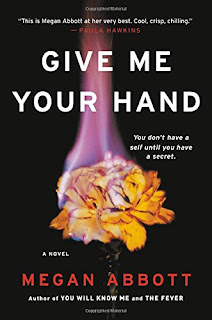A couple of years ago a friend
dismissed me with words I'd never have imagined could sting so deep.
Her voice, distantly glacial, informed me, "You're just like all
the rest."
My response
was immediate, born of startled disbelief and a welling panic. "No
I'm not. I am not!"
I swore I would prove I was different from the others, even if I
wasn't sure just what that meant. Yet I knew intuitively however
wrong it must be, she'd made up her mind. There would be no
dispensation.
Yesterday
it came to me while reading Give
Me Your Hand:
In certain primal, irredeemable ways beyond my capacity to mitigate
or alter, I am like my brothers. Sadly, I see now with a clearer eye
how justly we deserve the consequences of our behavior toward our
sisters under any conceit to the contrary. I owe this long overdue
insight to Megan Abbott’s piercing, unnerving new novel, which
spotlights one of the darker pockets of la
difference. Jarring
my Paleo impulses with a 21st-century
sensibility, Give
Me Your Hand
does bring hope a greater understanding of ourselves may at least
temper the vive
at both poles of its spectrum.
And
wouldn’t you know, to this end science is probing in a field so
alien to me its density added significant weight to an academic
catastrophe decades ago from which I’ve never fully recovered:
chemistry. In this instance more specifically, biochemistry. The
novel’s landscape of academic treachery and dangerous laboratories
provides an ironic backdrop for Abbott’s masterfully dark tale of
Kit and Diane, two brilliant young women vying for a shot at a highly
coveted job researching the causes of premenstrual rage that drives
some of their gender to self-mutilation, suicide, and murder.
Kit
and Diane have sort of known each other since high school, running
track, sharing secrets, competing scholastically—the smartest of
their peers. Yet there’s something missing, or rather something
present, that keeps them emotionally at odds. The specific “thing”
that’s to blame is kept from us awhile, fairly obvious tho it is,
but by confirming our guess early on, Abbott hooks us and reels our
curiosity into deeper, uncharted waters. The expression
suspense is killing me
takes on pulse-quickening authenticity as her narrative sprints
toward its climax.
Give Me Your Hand reads like a diary, and the intimacy of Kit's thoughts is as discomfiting
as it fascinates. The sensation’s eerily akin to trespassing on
someone’s privacy. Things we shouldn’t know. About them, about
us. The “us” here is my gender, and we don’t come off looking
so
good.
A cast of recognizable caricatures for the context, drawn with an
embarrassing, Shakespearean accuracy. This motley crew of pricks,
slicks, oddballs, and rogues comprises an appropriately nonsupporting
cast that provides ballast for the novel’s essential theme, that
the historical figurative screwing of women continues unabated. What
gives the job that’s enticing Kit and Diane such precious cachet is
the traditional dearth of interest in the scientific community for so
vital a female mystery.
“Everyone
will ask you why you chose to study PMDD,” Dr. Lena Severin says in
a pitch for the research team she’s assembling. “And you will
tell them how underfunded research into women’s conditions is. You
will tell them there are five times as many studies on erectile
dysfunction as on PMS and that you’re happy to play a role in
changing that.” Here’s Kit explaining PMDD to us ignoramuses, who
so dearly need to know:
Premenstrual dysphoric
disorder, that’s the subject of the study. A set of symptoms with
no agreed-upon cause. Some kind of catastrophic monthly dance between
hormones and the feeling and thinking parts of the brain. Striking
every month, it’s like PMS only much, much worse. Debilitating mood
swings, uncontrollable rage. Abnormal signaling among cells, that’s
what scientists only recently discovered. An intrinsic difference in
the way these women respond to sex hormones. After decades of doubt
about whether it even existed, now science has proven PMDD is not
only real, it’s part of the genetic makeup. The women can’t help
it, are slaves to it…
At its worst, it’s led women
to self-destructive acts. Or destructive ones. In the lab, we’ve
all heard the horror stories: Women in its grip hitting their
boyfriends over the head with frying pans, rear-ending their
children’s teachers’ cars in the school parking lot. Road rage,
baby shaking, worse.
“Behind
their hands, behind their smirks, some of the postdocs call it
Hatchet PMS. Medusa Menses,” she tells us of her lab mates.
“They’re all men except me, and they can’t even talk about it
without twisting their mouths or ducking their heads or making Carrie
or Lizzie Borden jokes.”
 |
| Megan Abbott |
Abbott
describes in an NPR
interview
how she became interested in PMDD as a topic to explore in a novel. A
deep, fearsome mystery science has merely scratched the surface of
understanding. Educated fiction is a good place to start for the rest
of us. At least it can give us a hand in stepping away from
ignorance. We need more of that every day. I now know my friend was
right. I was
like all the rest. Still am, to some degree, though I’m not quite
as dumb as then.


Oops, put my comment on Megan Abbott's book under the Cruz Smith book. SO SORRY!!! So I'll put my Smith comment on here and that makes everything all right. Ha. At any rate. I did enjoy the couple of Martin Cruz Smith books I read a while back. Most especially POLAR STAR.
ReplyDeleteHa, indeed! I read Polar Star last week. Will have it for Friday. Starting Havana Bay now. Opens with Pribluda's rotting body being fished out of the bay. Renko's flown over from Moscow to ID the remains. Bleagch!
DeleteI have not read anything by Megan Abbott yet, and I need to do something about that. I have Queenpin and You Will Know Me, but not this newest book. This one covers a very scary topic.
ReplyDeleteMegan's on top of her game, Tracy. Reading this one was an aerobic workout!
Delete